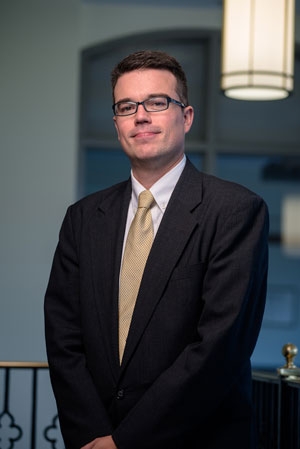 Economist Joshua Hall, a co-author of the 2014 Economic Freedom of the World report due for release next month, will offer an advance look at its findings when he visits Washington College on Tuesday, September 30.
Economist Joshua Hall, a co-author of the 2014 Economic Freedom of the World report due for release next month, will offer an advance look at its findings when he visits Washington College on Tuesday, September 30.
Hall, one of three authors of the annual report, will present an illustrated talk that summarizes its contents and explains how its findings are used in economic literature around the globe. His presentation will begin at 7:00 p.m. in Decker Theatre, Gibson Center for the Arts, on the College campus, 300 Washington Avenue. A reception will follow in the Underwood Lobby.
The Economic Freedom of the World report is prepared annually by the The Economic Freedom Network, an organization with member institutes in more than 80 nations. The Network and its report are initiatives of the Fraser Institute, an independent think tank headquartered in Vancouver that studies the impact of competitive markets and government interventions on individuals and society.
The authors of the Economic Freedom of the World project believe that individuals enjoy economic freedom “when property they acquire without the use of force, fraud, or theft is protected from physical invasions by others and they are free to use, exchange, or give their property as long as their actions do not violate the identical rights of others.” They measure economic freedom in five different areas: (1) size of government, (2) legal structure and security of property rights, (3) access to sound money, (4) freedom to trade internationally, and (5) regulation of credit, labor, and business.
“Research shows that people living in countries with high levels of economic freedom enjoy greater prosperity, more political and civil liberties, and longer life spans,” according to a news release on the 2013 report, which ranked Hong Kong as the most economically free country in the world, and placed the United States at number 17.
Joshua Hall is an associate professor of economics at West Virginia University, where he earned his Ph.D. in economics. He holds a bachelor’s degree in business administration and a master’s in economics from Ohio University. Before joining the faculty at West Virginia, he was the Elbert H. Neese, Jr. Professor of Economics at Beloit College and an economist with the Joint Economic Committee of the U.S. Congress. Author of more than 100 academic journal articles, book chapters, and scholarly studies, he also edited Homer Economicus: The Simpsons and Economics (Stanford University Press, 2014).
His September 30 talk is sponsored by the College’s Department of Economics and Institute for Religion, Politics and Culture, along with the Washington College Republicans. Funding is provided by the William James Forum



Write a Letter to the Editor on this Article
We encourage readers to offer their point of view on this article by submitting the following form. Editing is sometimes necessary and is done at the discretion of the editorial staff.